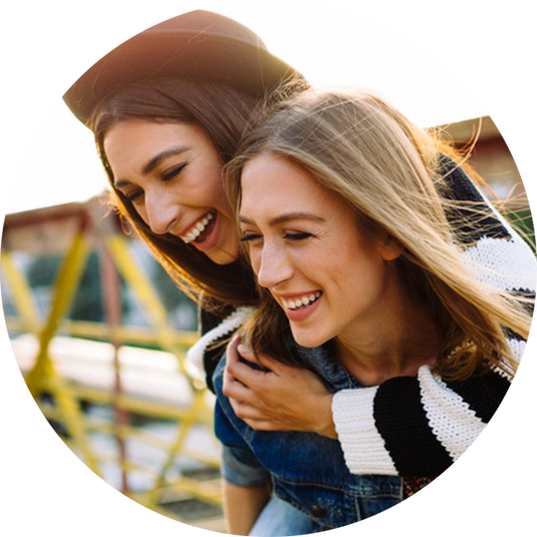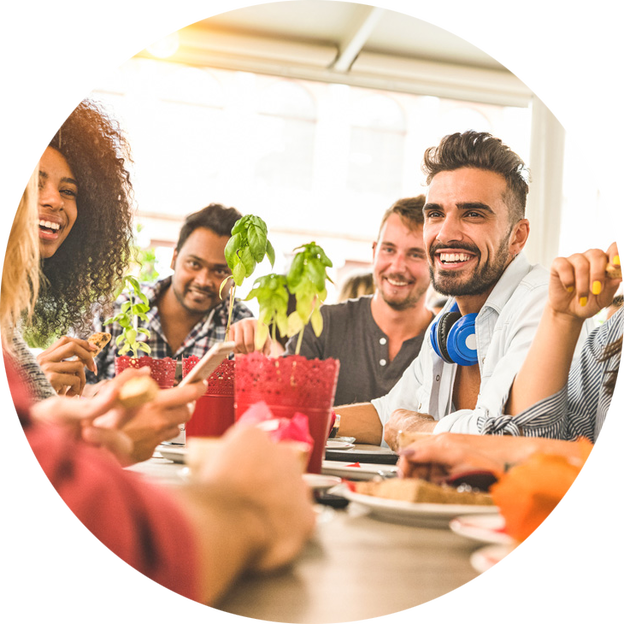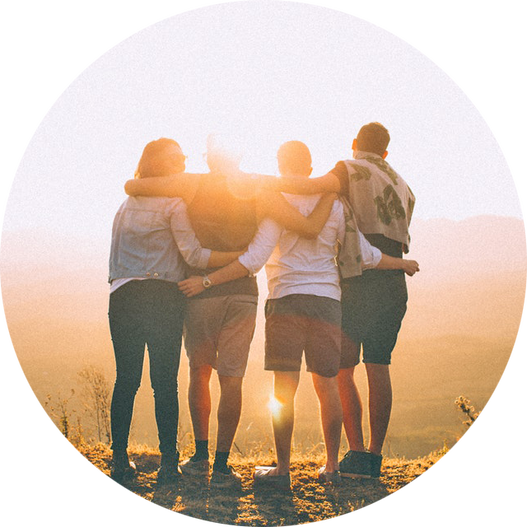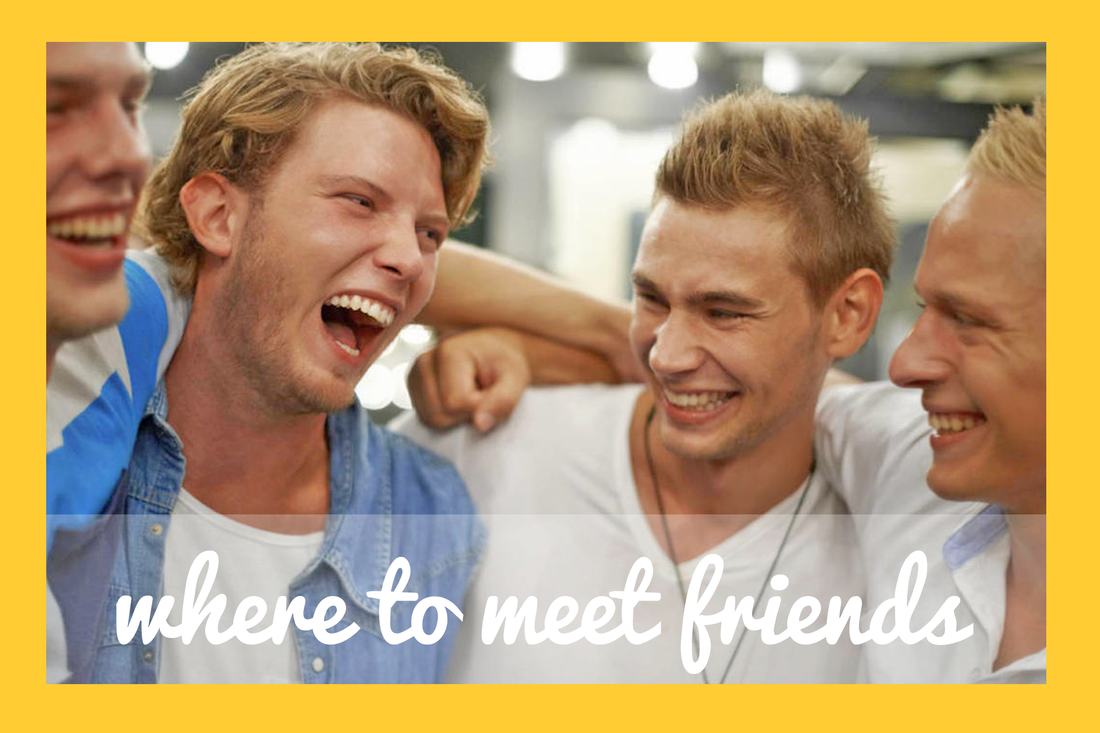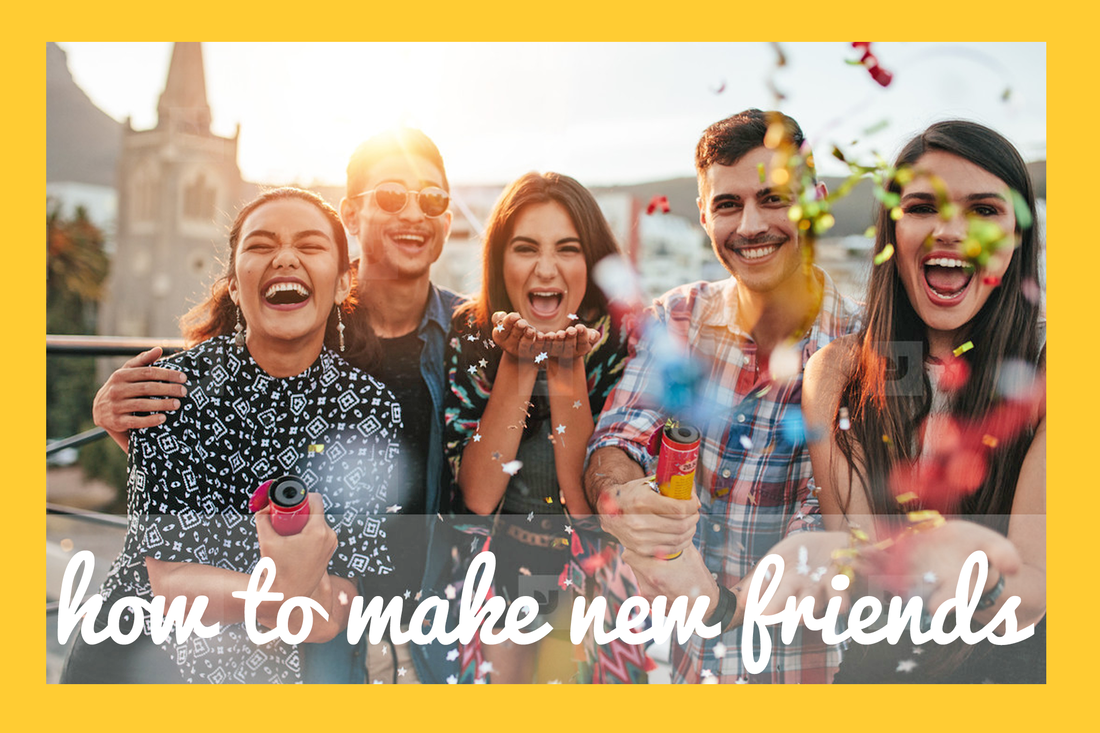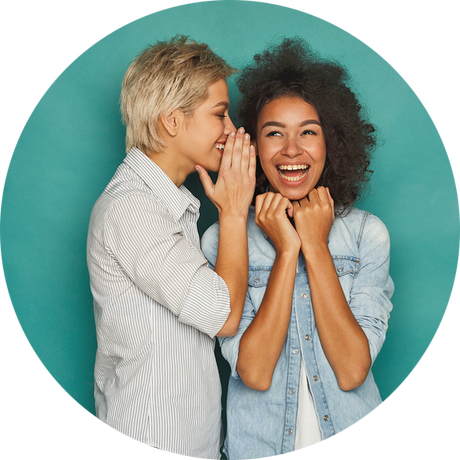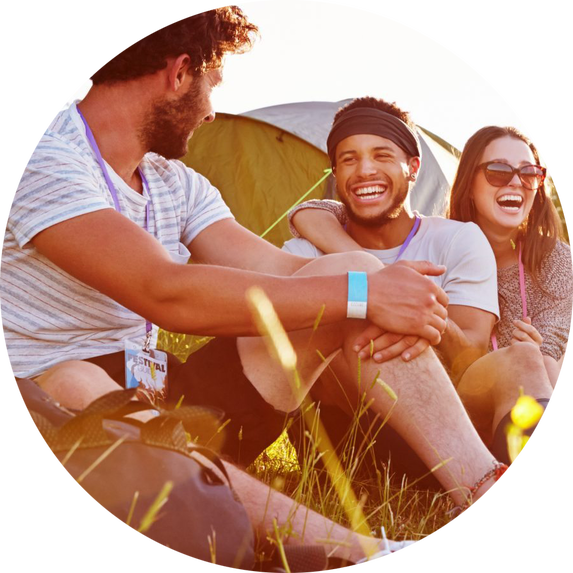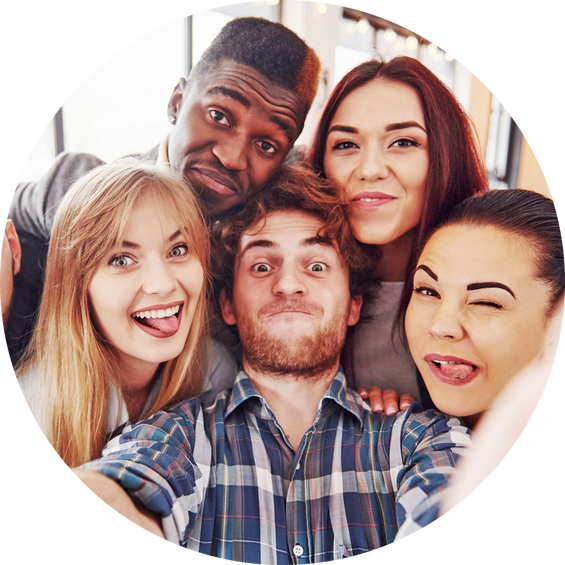La amistad
Serie I
Tener buenas amistades sólidas profundiza nuestra experiencia de la vida. Nos ayudan a combatir la depresión, la ansiedad y la soledad a la vez que nos alientan a ser nuestro propio a ser más auténtico y al dejar ir nuestras inhibiciones — de ellos aprendemos el tipo de amistad que queremos de nuestras relaciones románticas, nuestras relaciones sexuales, y más que nada de nuestros futuros matrimonios.
Entonces ... ¿Cómo hacemos nuevos amigos, cómo los llegamos a mantener cerca de nuestro corazón, cómo podemos mejorarlos cuando los tengamos y en algunas ocasiones cuándo debemos de terminar ciertas amistades y cómo es que nos convertimos en nuestro mejor amigo?
Entonces ... ¿Cómo hacemos nuevos amigos, cómo los llegamos a mantener cerca de nuestro corazón, cómo podemos mejorarlos cuando los tengamos y en algunas ocasiones cuándo debemos de terminar ciertas amistades y cómo es que nos convertimos en nuestro mejor amigo?
Cómo hacer nuevos amigos
Hacer nuevos amigos cómo adultos puede ser un poco desalentador. Así que vamos a desglosar un poco el proceso en este vídeo.
Serie podcast: La amistad
Si prefieres escuchar un podcast porque se te hace más conveniente, entonces revisa mi serie de podcasts sobre este tema en mini episodios.
La mejor terapia medicinal es la amistad y el amor
— Hubert H. Humphrey
— Hubert H. Humphrey
Hacer nuevos amigos
En primer lugar, reconozcamos que la forma en que hacemos nuevos amigos cambia con el tiempo. En general, es mucho más fácil cuando somos más jóvenes y vemos al mismo grupo de personas todos los días que en muchas ocasiones son durante años. Este tipo de consistencia al menos brinda la oportunidad de conocer mejor a las personas, aunque el grupo de personas en el que esté uno no sea ideal.
Con el tiempo, no siempre tenemos los mismos entornos consistentes, como la escuela o la universidad para conocer gente. Puede tomar más tiempo y esfuerzo para conocer gente nueva en diferentes lugares. También, nuestras prioridades cambian al crecer, con lo cual podemos buscar cualidades muy específicas y buscar en estas nuevas amistades los mismos valores; esto para muchos de nosotros no lo hacíamos cuando jóvenes.
Con el tiempo, no siempre tenemos los mismos entornos consistentes, como la escuela o la universidad para conocer gente. Puede tomar más tiempo y esfuerzo para conocer gente nueva en diferentes lugares. También, nuestras prioridades cambian al crecer, con lo cual podemos buscar cualidades muy específicas y buscar en estas nuevas amistades los mismos valores; esto para muchos de nosotros no lo hacíamos cuando jóvenes.
Terapia para amigas
¿Dónde puedo encontrar amigos?
No es suficiente saber qué tipo de amigos quieres hacer, también necesitas ponerte al tanto al involucrarte en diferentes actividades.
- Amigos de amigos (decir sí a los eventos / fiestas / eventos sociales de grupo y pedir recomendaciones a personas en diferentes lugares geográficos)
- Trabajo y redes sociales (BNI, Rotary Clubs, Reuniones con clubes de comercio)
- Cursos de estudio (es decir, cocina, fotografía, idiomas extranjeros)
- Deportes y actividades físicas (es decir, fútbol, ligas de bolos, ciclismo, clases grupales, yoga, senderismo, escalada, acampadas silvestres, baile)
La amistad con uno mismo es muy importante, porque sin ella no se puede ser amigo de nadie más en este mundo.
— Eleanor Roosevelt
— Eleanor Roosevelt
¿Dónde puedo encontrar grupos sociales?
- Periódicos locales: método "a la antigüa" puedes encontrar la sección posterior donde se enumeran las actividades o grupos sociales
- Búsqueda de Google: puedes hacer un bosquejo basado en la ubicación y en el interés
- Grupos online: diseñados para reunir a las personas, como Meetup.com, FriendMatch.com y aplicaciones como Nearify para encontrar eventos cercanos
- Eventos / Grupos de Facebook: puedes crear / encontrar grupos de Facebook con un interés común (natación, fútbol, deporte, libros)
- Otras Aplicaciones: como Goldstar & LivingSocial & TodayTix & GroupOn
¿Qué busco en un amigo?
Al hacer nuevos amigos, pregúntate a ti mismo: "¿Qué busco en un amigo?" Esta puede ser una pregunta similar a la que te preguntes a ti mismo cuando buscas a una pareja o un vínculo romántico.
¿Deseas tener los mismos intereses con tus amistades o amistades con aficiones nuevas? ¿Estás buscando un compañero para compartir actividades: como un compañero de entrenamiento, ir a salir de fiesta, ir de excursión, ir al cine? ¿Deseas un amigo que tenga valores fundamentales y similares a los tuyos o diferentes (es decir, un aventurero, un amigo juguetón, un amigo reflexivo, alguien leal, etc.), política, religión, cultura, raza, edad, género y orientación sexual? ¿Qué otra cosas crees que deberías de considerar?
Sé lo más específico posible que puedas y luego mantén tus nuevas amistades a la ligera mientras sigues conociendo gente nueva.
¿Deseas tener los mismos intereses con tus amistades o amistades con aficiones nuevas? ¿Estás buscando un compañero para compartir actividades: como un compañero de entrenamiento, ir a salir de fiesta, ir de excursión, ir al cine? ¿Deseas un amigo que tenga valores fundamentales y similares a los tuyos o diferentes (es decir, un aventurero, un amigo juguetón, un amigo reflexivo, alguien leal, etc.), política, religión, cultura, raza, edad, género y orientación sexual? ¿Qué otra cosas crees que deberías de considerar?
Sé lo más específico posible que puedas y luego mantén tus nuevas amistades a la ligera mientras sigues conociendo gente nueva.
There is nothing on this earth more to be prized than true friendship
— Thomas Aquinas
— Thomas Aquinas
¿Cómo puedo mantener y mejorar mis amistades existentes?
Hay momentos en la vida en los que notamos que nuestras amistades no son tan satisfactorias como nos gustaría que fuesen. Tal vez nuestros amigos se hayan vuelto esporádicos, unilaterales, aburridos, conflictivos o simplemente no comparten con nosotros los mismos valores y a veces, a lo largo del tiempo cambian y dejan de ser divertidos o tan consistentes como nos gustaría.
Si tus amistades se han vuelto obsoletas o poco deseables, ¡todavía hay esperanza!
La mayoría de las amistades necesitan un poco de atención, para funcionar de la mejor manera. Esto no significa necesariamente que nuestras amistades deban terminar o ser reemplazadas. Puede ser que al infundir un poco de atención y buena vibra hacia la amistad sea necesario o en algunos casos reconocer resentimientos para mejorar la relación.
Si tus amistades se han vuelto obsoletas o poco deseables, ¡todavía hay esperanza!
La mayoría de las amistades necesitan un poco de atención, para funcionar de la mejor manera. Esto no significa necesariamente que nuestras amistades deban terminar o ser reemplazadas. Puede ser que al infundir un poco de atención y buena vibra hacia la amistad sea necesario o en algunos casos reconocer resentimientos para mejorar la relación.
Determina áreas de mejora
Usa estas preguntas para evaluar el estado de sus amistades actuales:
Áreas problemáticas comunes en las amistades:
- ¿Hay alguna forma en que te gustaría mejorar tus amistades?
- Si es así, ¿cuánto tiempo ha estado pasando esto?
- ¿Siempre ha sido así?
- ¿Es este desafío único para esta amistad o qué es el denominador común?
- ¿Qué te gusta de la amistad?
- ¿Qué falta?
- ¿Qué hay que abordar?
Áreas problemáticas comunes en las amistades:
- Muy a menudo son unilaterales, y no recíprocas
- Falta de tiempo para pasarla juntos
- Demasiado escamosa
- Otras prioridades en tu camino
- Falta de respeto entre si
Terapia para amigas
Un amigo es alguien que te da toda la libertad para que seas realmente quién eres
-- Jim Morrison
Afinar tus amistades
Cambiar nuestros comportamientos, especialmente cuando hemos estado en un surco por un tiempo, no siempre es tan fácil. Esperemos que preocuparse por tu amistad sea al menos algo motivador. Puede sentirse torpe al principio o forzado, porque a veces lo que se nos pide es radicalmente diferente, pero con el tiempo y con la práctica, puede sentirse más fácil o al menos valer la pena.
Puede valer la pena hablar con tu amigo para empezar a tener una conversación de la siguiente manera:
Puede valer la pena hablar con tu amigo para empezar a tener una conversación de la siguiente manera:
- ¿Qué te gusta de nuestra amistad?
- ¿Hay alguna forma en que te gustaría mejorar nuestra amistad o qué podría hacer para mejorarla?
- Expresa gratitud por lo que su amistad aporta.
- Dele a su amigo el beneficio de la duda si está justificado y hágales saber cómo le gustaría que mejorara su amistad.
- Afirmar las necesidades de tus amistades mediante tus acciones y actitud
- Cambiar nuestra conducta, especialmente cuando hemos estado en un ciclo por un tiempo, no siempre es tan fácil. Esperamos que al preocuparse por nuestras amistades sea al menos algo motivador. El iniciar una conversación para mejorar la amistad puede sentirse un poco incómodo al principio o forzado, porque a veces lo que se nos pide es radicalmente diferente, pero con el tiempo y con la práctica, puede sentirse más fácil o al menos valer la pena hablar de cómo puedes mejorar tus amistades
Una de las bendiciones de los viejos amigos es que puedes permitirte ser bobo con ellos
— Ralph Waldo Emerson
— Ralph Waldo Emerson
Tratamiento específico para la amistad
Dependiendo del estado de tu amistad, puede ser que necesites un cambio significativo para continuar siendo amigos O un ligero ajuste de una o dos cosas. Sé honesto contigo mismo y con la otra persona a lo que es realista y posible cuando te comprometes a mejorar tu amistad.
Las mejoras pueden ser cosas como:
Las mejoras pueden ser cosas como:
- Pasando más tiempo de calidad juntos
- Pasando más tiempo juntos
- El uso de diversos medios de comunicación (es decir, en persona suele ser mejor para abordar conflictos, mientras que los mensajes de texto pueden ser excelentes para las actualizaciones y la rutina cotidiana).
- Afirmar y respetar los límites
- Estar presentes en eventos importantes o celebraciones
Re-Evaluación de cómo va tu amistad
Después de comunicaros entre sí de cómo va vuestra amistad, con suerte tomar un curso de acción diferente o adicional, no será necesario. Nota si las cosas han cambiado con el tiempo. ¿Hay ajustes necesarios o pequeños recordatorios? Después de haber realizado la debida diligencia, también puedes considerar si la amistad vale tanto tiempo / energía o si necesitas retirarte o incluso terminarla. No podemos ser amigos de todos. Solo tenemos muy poco tiempo, por lo que requiere ser estratégico con nuestro tiempo y energía.
Terapía para amigas
Obvious Signs a Friendship Needs to End
Destructive or even toxic friendships can wreak havoc on our lives. And sometimes, friendships can be problematic in other ways.
Here are a few more obvious signs you might want to end your friendship:
If it’s become clear, that despite your best efforts, your friendship needs to end, this is about prioritizing self-preservation. It’s important not to jeopardize your emotional, physical or psychological health and well-being to remain in a toxic relationship of any kind.
Here are a few more obvious signs you might want to end your friendship:
- Your friend is too self-absorbed (when they're unwilling to compromise, do things you want, ask how you’re doing, have an actual conversation & not just a monologue)
- They are exponentially more concerned with perceived slights than their own egregious behaviors, (more sensitive to what’s been done to them than their thoughtfulness with others)
- They repeatedly betray your trust (talking about you negatively behind your back, sharing information you’ve shared confidentially, is sexual with someone you’re involved with without your consent)
- They are consistently breaking plans/commitments (more times than not)
- Your friend consistently doesn’t show up for important events to support you
- They blame you for everything
- They don't take responsibility for their actions
- They constantly puts you down
- They even make you question your reality (i.e. gaslighting)
If it’s become clear, that despite your best efforts, your friendship needs to end, this is about prioritizing self-preservation. It’s important not to jeopardize your emotional, physical or psychological health and well-being to remain in a toxic relationship of any kind.
Less Obvious Signs a Friendship Needs to End
There are other less obvious signs a friendship may need to end, or at least be re-prioritized so that you spend less energy/time with them. Here are a few:
As a licensed marriage and family therapist, I believe in the healing power of relationships. We can be hurt and yet heal/grow in relationships too. Relationships take work, are not perfect and at times require repairs and maintenance.
So, if you’ve done your due diligence in trying to improve your friendship or it’s just too toxic or something happened that’s so egregious AND you’re actually ready to end your friendship, how do you do it?
- It becomes less convenient than spending time with other friends
- The cost/benefit ratio for the friendship doesn't pay off enough of the time
- Feels too one-sided too much of the time
- You have a desire to prioritize other friendships you find more consistently rewarding
- Too negative too much of the time, despite your efforts to shift and communicate your needs
As a licensed marriage and family therapist, I believe in the healing power of relationships. We can be hurt and yet heal/grow in relationships too. Relationships take work, are not perfect and at times require repairs and maintenance.
So, if you’ve done your due diligence in trying to improve your friendship or it’s just too toxic or something happened that’s so egregious AND you’re actually ready to end your friendship, how do you do it?
My best friend is the one who brings out the best in me
— Henry Ford
— Henry Ford
Assess Your Readiness to End a Friendship
Ask yourself the following questions:
- Have you asserted your needs in consistent enough ways?
- Have you done due diligence in trying to better the friendship (putting more into the friendship yourself, like time, energy, presence, positivity)?
- Do you have other support systems in place?
- Have you imagined what it would be like without them in your life, realistically?
- Is there any other prep work you need to do beforehand?
- How safe do you feel physically, sexually, psychologically, emotionally, and financially? If need be, create a safety plan to exit/leave and/or protect yourself. In extreme cases, get a temporary restraining order if needed and seek professional support and/or legal advice.
- If they have a history of self-harm, do you need to contact their social support to let them know you're ending the friendship so they can be there for them?
Ending Friendships
Ending a Friendship?
How to end depends on the context of your friendship and your own safety.
Here are three different methods depending on the reasons for needing to end a friendship:
Here are three different methods depending on the reasons for needing to end a friendship:
- Slowly fading out: most peripheral friendships that end, die out naturally over time. Having a non-dramatic and mutual withdrawal is where you spend less and less time together interacting. You initiate less. You accept less invitations to talk or hang-out. Sometimes this happens without our intent where we get distracted by work or other priorities. We can’t be friends with everyone and only have so much time in our day, so we need to be somewhat selective in how we want to spend our time.
- Break-up conversation: for those who are more significant in our lives, or for those that aren’t able to slowly fade out, sometimes we need to end a friendship directly by communicating our intention to do so. Like the concept of “conscious uncoupling” in primary romantic relationships, it’s important to do so in a clear but kind way. There’s no need to do a scorched-earth kind of withdrawal. A little compassion, even if you’re hurt, betrayed or angry, can go a long way to creating a more compassionate world too. Compassion doesn’t mean permitting someone to treat you poorly, rather it’s taking responsibility for what you own and not owning what someone else needs to take responsibility for. It’s being clear and setting firm boundaries.
- Cold-turkey withdrawal: when a friendship has gotten volatile, abusive or toxic, sometimes the best response is to cut off the friendship cold-turkey. This can be about removing any access they had earlier to communicate with you (like blocking their phone number and/or de-friending, blocking or not following them on social media).
The only way to have a friend is to be one.
— Ralph Waldo Emerson
Becoming Your Own Best Friend
The relationship we have with ourselves is the most important relationship in our lives. It's one that's with us from birth until death, 24/7, and 365 days a year. Literally no one else on the planet can be there in the same way that we can be there for ourselves.
How Did We Create a False Self?
This topic is near and dear to my heart, especially because as a teenager, I was my own worst critic to the point of having a tremendous amount of self-hatred and rejection. Now, I didn't start out this way; none of us do, but our environment certainly has an impact on this, right? So, whether we're bullied by our peers, whether we're rejected by our families or society at large, it really has an impact, especially when our brains haven't developed enough to really understand what's going on.
Many of us grow up in environments where we don't even get basic support for our natural way of being, our personalities, and our way interacting with the world. Instead, we may get messages that we're expected to be perfect, never make mistakes, and may even receive demeaning attitudes and ridicule for our core essential-self. We learn ways of adapting, like only showing certain parts of ourselves that get better results. In order to be loved or accepted or safe, we can even create a false self.
It's a brilliant defense. It's effective in a lot of different ways, and so it's important not to dis our defenses, but rather appreciate where they came from and how they helped us to survive. However, if we use these approaches into adulthood, into our relationships, into our careers, it can really inhibit our full potential.
Many of us grow up in environments where we don't even get basic support for our natural way of being, our personalities, and our way interacting with the world. Instead, we may get messages that we're expected to be perfect, never make mistakes, and may even receive demeaning attitudes and ridicule for our core essential-self. We learn ways of adapting, like only showing certain parts of ourselves that get better results. In order to be loved or accepted or safe, we can even create a false self.
It's a brilliant defense. It's effective in a lot of different ways, and so it's important not to dis our defenses, but rather appreciate where they came from and how they helped us to survive. However, if we use these approaches into adulthood, into our relationships, into our careers, it can really inhibit our full potential.
Le us be grateful to people who make us happy, they are the charming gardeners who make our souls bloom
— Marcel Proust
— Marcel Proust
How Do We Befriend Ourselves?
How do we become our own best friends, especially if we already have a pretty conflictual or toxic relationship with ourselves? In order to better our relationships, to embrace our life more fully, and to change the world we live in, we need better our relationship with ourselves.
What does it mean to become your own best friend? What does this look like? It's not just in moments when we're struggling that it's important to befriend ourselves and care and attend to whatever pain is there in the moment. It also means enjoying life, right? Allowing ourselves to play and to experience pleasure and joy. It's showing up for ourselves, not just when we're down and out, but also when we're enjoying and celebrating life. So, it's multifaceted.
What does it mean to become your own best friend? What does this look like? It's not just in moments when we're struggling that it's important to befriend ourselves and care and attend to whatever pain is there in the moment. It also means enjoying life, right? Allowing ourselves to play and to experience pleasure and joy. It's showing up for ourselves, not just when we're down and out, but also when we're enjoying and celebrating life. So, it's multifaceted.
Going Back to the Basics
Developing a friendship with ourselves, a better friendship, really requires us to go back to the basics. Again, if we're meeting someone for the first time, we're going to be asking questions and approaching things hopefully from a place of curiosity and non-judgment. What's their history? What makes them tick? What are their core values, thoughts, feelings, and needs? What makes them who they are? We can apply that same principle of curiosity and non-judgement to ourselves, especially if we've neglected or have a toxic relationship with ourselves.
In order to do this, we need to take ourselves off autopilot and reconnect to our five senses because they can deliver useful messages. That can be a way for us to get to know ourselves. If our heart starts racing, maybe it's about some level of excitement or fear, and we can follow that path and be curious about what in our present moment environment is bringing up certain thoughts and feelings and physical sensations. If we're recognizing that we're hearing or seeing something in a particular way that's pleasurable or upsetting, it's one of the ways that we register and get to know ourselves.
This is also about showing up when we're having a bad day or struggling with something, instead of kicking ourselves when we're down. Sometimes it can be useful to imagine our younger self that needs some love, validation, attention, support. We don't have to attend to every desire of our younger self immediately. Sometimes we need to set boundaries but we can also build a relationship with ourselves where we recognize, "Oh, I'm at work, or I need to attend to something, and I will spend some time with you later addressing the hurt feelings or whatever else is going on."
In order to do this, we need to take ourselves off autopilot and reconnect to our five senses because they can deliver useful messages. That can be a way for us to get to know ourselves. If our heart starts racing, maybe it's about some level of excitement or fear, and we can follow that path and be curious about what in our present moment environment is bringing up certain thoughts and feelings and physical sensations. If we're recognizing that we're hearing or seeing something in a particular way that's pleasurable or upsetting, it's one of the ways that we register and get to know ourselves.
This is also about showing up when we're having a bad day or struggling with something, instead of kicking ourselves when we're down. Sometimes it can be useful to imagine our younger self that needs some love, validation, attention, support. We don't have to attend to every desire of our younger self immediately. Sometimes we need to set boundaries but we can also build a relationship with ourselves where we recognize, "Oh, I'm at work, or I need to attend to something, and I will spend some time with you later addressing the hurt feelings or whatever else is going on."
A friend is a gift you give yourself
— Robert Louis Stevenson
— Robert Louis Stevenson
Rebuilding Trust with Ourselves
This process is also about rebuilding trust in ourselves if it's something that's diminished over time. We do this through consistent action, not being too rigid, having some level of flexibility, but also making sure that we're taking steps to do the things that we want to do in life, to treat ourselves well. This can be about giving ourselves enough good nutrition, consistent sleep and exercise. This is also about just showing up for ourselves, not from a punitive, judgy place, but from an expansive, caring, "I deserve this" sort of place.
When we're struggling, when we're experiencing some pain, oftentimes what we need the most is to just sit and be with ourselves. Sometimes we don't need the advice giving. Sometimes we just need the recognition of the feeling itself, the feeling state, and caring for it in whatever ways are appropriate in the given moment.
We can do this for ourselves like we would a friend who's sharing some painful experience they've had where they feel upset. Oftentimes it's enough to just say, "Hey, I care. I get it. I've been through that. I'm here. I care. It matters to me how you're feeling." That can be the perfect medicine in so many different ways, and we also need to be able to do that for ourselves in moments when nobody's around, when we need to be there for ourselves some of the time and not just have other people do that for us.
To develop that level of relationship with ourselves can be tremendously rewarding and help us deal with the natural ups and downs of life.
When we're struggling, when we're experiencing some pain, oftentimes what we need the most is to just sit and be with ourselves. Sometimes we don't need the advice giving. Sometimes we just need the recognition of the feeling itself, the feeling state, and caring for it in whatever ways are appropriate in the given moment.
We can do this for ourselves like we would a friend who's sharing some painful experience they've had where they feel upset. Oftentimes it's enough to just say, "Hey, I care. I get it. I've been through that. I'm here. I care. It matters to me how you're feeling." That can be the perfect medicine in so many different ways, and we also need to be able to do that for ourselves in moments when nobody's around, when we need to be there for ourselves some of the time and not just have other people do that for us.
To develop that level of relationship with ourselves can be tremendously rewarding and help us deal with the natural ups and downs of life.
Wishing to be friends is quick work, but friendship is a slow ripening fruit
— Aristotle
— Aristotle
Recognizing Our Inherent Worth
Lastly, I want to acknowledge that we all have inherent worth and value, simply for being human. It's our birthright. This can be a difficult concept to grasp or believe in. Sometimes we hear messages that we have to prove our worth by what we produce, how much we earn, what we look like and on and on and on. This gets in the way of being our most authentic self and living life from this place more of the time. We have unconditional worth and value regardless of what we say or do or don't say or don't do. There's nothing to prove because it's already there in all of us. It exists inherently as part of our humanity. When we operate from this knowledge then we more naturally live in ways that are in alignment with our core values.
Again, the most important relationship we'll have in this life is with ourselves. Enjoy!
Again, the most important relationship we'll have in this life is with ourselves. Enjoy!

